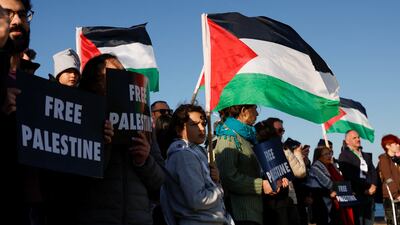Oman’s Foreign Minister has called for an urgent international conference dedicated to recognising Palestinian statehood, at which Hamas would be included.
At a lecture in the UK on Thursday, Sayyid Badr Al Busaidi criticised world leaders for their delay in recognising the state of Palestine, and urged an emergency congress to be held.
“The world has deferred the question of Palestinian statehood for far too long,” he told the Oxford Centre for Islamic Studies.
"Too many of those who speak today in favour of a two-state solution regard this as an objective to be achieved in the distant future.
“It has to be done on an urgent basis. The world can’t afford any more violence and we need a Palestinian state.
"Hamas must have a seat at the negotiating table, despite its proscription as a terrorist organisation in many countries.
“Hamas cannot be eradicated. If there is ever to be peace, the peacemakers will have to find a way to talk with them and to listen,” Mr Al Busaidi said.
He did not specify how they would sit alongside the Palestine Liberation Organisation, which represents all Palestinians.
Asked if Israel would agree to be part of such a conference, Mr Al Busaidi said it was doable with the international community’s backing.
“The same way we got Israel to go to Madrid,” he said, referring to the 1991 conference in the Spanish capital that sought to revive the Palestinian-Israeli peace process.
“If the will of the international community is to be realised, there is no escape. It is doable just like it was doable back then in the 1990s."
Mr Al Busaidi declined to suggest whether or not Oman would host such a conference, but said the UK and European countries had a role to play.
“All of these players are important and they should be part of this conversation," he said. "Only through dialogue can we reach a common understanding for the benefit of all."

Mr Al Busaidi met UK Foreign Secretary David Cameron in January to discuss the humanitarian crisis in Gaza.
He praised Mr Cameron’s intimation that the UK would consider recognising a Palestinian state “sooner rather than later", but feared this could take time.
“I was heartened. But I did urge him to put his words into action,” Mr Al Busaidi said.
The UK's opposition leader Keir Starmer has appeared to waver on his party's earlier commitment to unilaterally recognise Palestinian statehood, although shadow foreign secretary David Lammy this month said it was still possible.
Oman has historically adopted a position of neutrality in regional conflicts.
The sultanate was a mediator for the international community on behalf of the Houthis, an Iran-backed rebel group, during the Yemen civil war.
It may find itself in that position again, in light of the Houthi attacks on international shipping in the Red Sea.
Mr Al Busaidi accused western powers of maintaining a “cold war mentality” that led them to see the world in terms of “binary opposition, zero-sum games and elective communication".
Non-state actors such as Hamas were part of a new, “multipolar world”, and western powers would need to engage with them to ensure peace, he said.
“There is failure to come to terms with the reality of a multipolar world," he said. "This will involve breaking what for many has been the habit of a lifetime."
Western powers had adopted a “sectarian logic” of the Middle East, in which they assumed that people were driven by their religious identities, Mr Al Busaidi said.
“It assumes that people of the region are … simply following the sectarian script; they’re not used to making the independent judgment that people in the West are used to making,” he said.
The proposed international conference must reject binary or sectarian visions in order to succeed, Mr Al Busaidi added.
The recognition of Palestine was a key part to peace in the region, he said.
“The creation of a Palestinian state is an existential necessity. We can return to the hopeful path of the Arab Nahda [Enlightenment], and one of its hopes can be Jerusalem."


